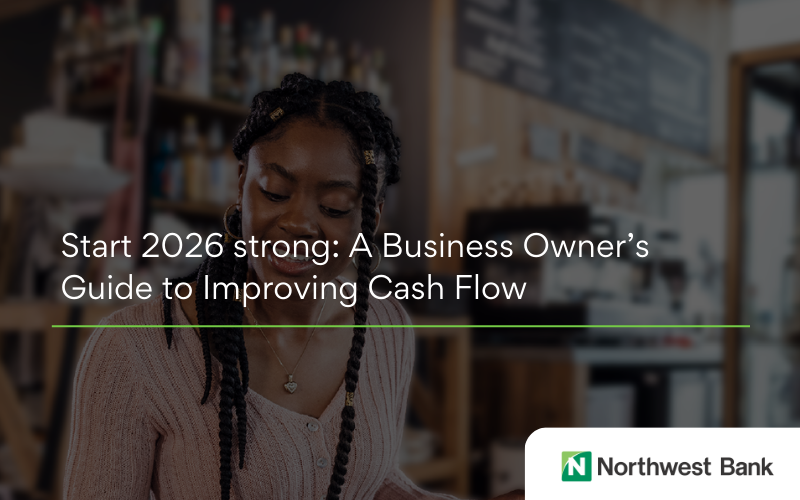Understanding Bank Fees and How to Avoid Them
Key takeaways:
- Financial institutions often charge a variety of fees for various services, which can depend on how you use your account(s).
- Northwest Bank offers several features and tools, like overdraft protection and alerts, to monitor your spending, that can help you avoid fees.
- In addition, using ATMs within your bank’s network and setting a minimum monthly balance in your checking account may help you avoid ATM fees or monthly maintenance charges.
At Northwest Bank, we understand that you work hard for your money and every dollar counts. We also know that financial hiccups can happen — often through no fault of your own.
Still, virtually all financial institutions charge fees, which help cover the cost of services you get from your bank, from personalized service in financial centers to convenient access through a nationwide network of ATMs. That’s why we offer features and tools designed to support you and help you avoid unnecessary fees before they occur.
Thankfully, it may be easier than you think to avoid some or all of these fees, and we're here to help you do so. Read on to learn simple steps you can take to save on fees and keep more money in your account.
How Northwest Bank helps you avoid overdraft fees
If you’ve ever accidentally made a purchase without having enough money in your checking account, you may be familiar with overdraft fees. Overdraft fees occur when a transaction puts your checking account into a negative balance. Financial institutions typically charge a fee per overdrawn transaction, up to a maximum fee per day.
And, unfortunately, overdrafts can easily happen by accident. They could occur if your paycheck hits your bank account a day late, or if a merchant processes a payment a day before you expected them to. Overdrafts can also happen as a result of your day-to-day spending: The average overdraft amount is less than $24, but overdraft fees can cost $35 per transaction or more.
However, we offer a few options to help prevent overdraft fees.
1. Set up account alerts
Northwest Bank makes it easy to stay informed of your account balance with customizable alerts that notify you when your balance is low or a transaction posts, so you’re always a step ahead. You can also receive alerts any time your card is used and keep tabs on recurring payments and subscriptions to manage the money coming out of your account.
It all adds up to more visibility into your spending habits, so you identify when you’re at risk of overdraft fees and plan accordingly.
2. Use overdraft protection
Often, overdrafts occur when you have the money to cover a transaction, but it’s sitting in the wrong bank account. At Northwest, we also offer a Courtesy Overdraft program. When an overdraft occurs, instead of declining the transaction, Northwest may pay the transaction on your behalf. However, this service comes with fees, so it's important to understand when and how it applies.
We also offer overdraft protection: A feature that allows you to borrow money from your own accounts to avoid overdraft fees.
When you complete a transaction that would overdraft your account, overdraft protection pulls in funds from another one of your bank accounts — such as another checking account, a savings account or a line of credit — to bring your checking account back up to a $0 available balance. That way, you'll be able to complete the transaction but avoid overdraft charges. And, if you have a Northwest Bank checking account, overdraft protection is free too.
Example: You’re making a $50 purchase, but you only have $25 in your checking account.
-
Without overdraft protection: Your account would be overdrawn after the transaction, with a balance of -$25. That means your bank might decline the transaction. Or, you could overdraft the account, in which case, you’d need to pay the $25 you owe, plus the overdraft fee.
-
With overdraft protection: Northwest Bank would transfer the required $25 out of the account of your choice to bring your checking account balance back up to $0, allowing you to avoid overdraft fees.
Overdraft protection helps you better manage your money, since you won’t need to pay overdraft fees on top of paying for your purchases. You might opt to pair overdraft protection with account alerts, for example. That way, you’ll know when your balance is running low so you can adapt your spending accordingly — but you’ll have overdraft protection as an added measure to help you avoid fees if the unexpected happens.
At Northwest, we also offer a Courtesy Overdraft program. When an overdraft occurs, instead of declining the transaction, Northwest may pay the transaction on your behalf. However, this service comes with fees, so it's important to understand when and how it applies.
-
Learn more about Northwest Bank’s Overdraft Protection options
3. Set up Early Pay to get paid faster
Of course, the easiest way to avoid overdrafts is to deposit your pay into your account as soon as possible. And Early Pay, a feature in Northwest Bank’s online and mobile banking, may be able to help.
Early Pay can allow you to access the funds from direct deposits into your checking account up to two days early. With Early Pay, you can receive your money once Northwest receives your qualifying direct deposit — even if that happens before the scheduled payment date.
Example: Your employer distributes direct deposit payments on Wednesdays, but your scheduled payday is Friday.
-
Without Early Pay, you’d receive your direct deposit payment on Friday
-
With Early Pay, you could receive your direct deposit payment as early as Wednesday.
Early Pay is available for a range of direct deposits, as long as those deposits are made into your Northwest Bank personal checking account. If you’re eligible, Northwest Bank will apply Early Pay automatically — no need to sign up.
Which direct deposits are eligible?
-
Payroll
-
Social Security benefits
-
Military payments
-
Veterans Administration benefits
However, keep in mind that while Early Pay can help you get paid up to two days early, the timing depends on when Northwest receives your payroll or benefits payment. It’s a good idea to set up account alerts in combination with Early Pay, so you’ll know right away when the money is deposited into your account.
How to avoid other bank fees
Try these tips to minimize additional bank fees:
How to avoid monthly maintenance fees
Monthly maintenance fees are flat rate fees associated with holding an account. While each type of account has its own fee structure, many banks offer options with low or no monthly maintenance fees.
Ask your financial institution about the range of checking accounts available to you, so you can select the lowest-cost one that still meets your needs. If you’re a student, let the bank know — they may offer free student checking accounts.
Finally, you may be able to avoid monthly maintenance fees for depositing or keeping funds in the account. Some banks waive monthly fees if you maintain a set minimum balance, or if you deposit a certain amount into your account each month.
.
How to avoid ATM Fees
Many financial institutions offer no-fee withdrawals at ATMs within specific networks, but charge fees for using ATMs operated by other financial institutions. Additionally, other financial institutions may charge their own fees to withdraw cash using their ATM.
In effect, this means you may pay two separate ATM fees when using another bank's ATM: One charged by your own financial institution and one charged by the other bank.
You can avoid fees by searching for nearby ATM locations and using your bank’s ATM network to make withdrawals. If you’re travelling, consider taking out cash at your local ATM before you go, or use other payment methods, like your credit card, to avoid ATM fees.
Get help optimizing your financial plan
We're here to help you stay ahead no matter what life brings. Our dedicated team of experts can help you choose the right bank accounts, so you aren’t paying for more features than you need, as well as set up tools like overdraft protection and account alerts to help you manage your money.
Ready to feel more confident in your finances? Click here to find a Northwest Bank financial center near you.




